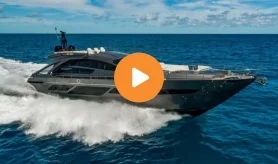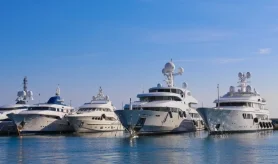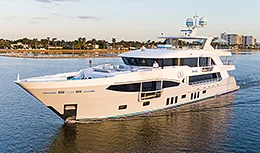- Alaskan Yachts
- Azimut Yachts
- Back Cove Yachts
- Beneteau Yachts
- Benetti Superyachts
- Bertram Yachts
- Boston Whaler
- Broward Yachts
- Buddy Davis Sportfish
- Burger Yachts
- Cabo Yachts
- Catamarans
- Carver Motoryachts
- Center Console
- Chris-Craft Yachts
- Cruisers Yachts
- DeFever Trawlers
- Dufour Sailboats
- Fairline Yachts
- Feadship Yachts
- Ferretti Yachts
- Formula Yachts
- Fountaine Pajot Cats
- Grady-White
- Grand Banks Trawlers
- Hargrave Yachts
- Hatteras Yachts
- Hinckley Picnic Boats
- Horizon Yachts
- Hydra-Sports
- Intrepid Boats
- Jarrett Bay Sportfish
- Jeanneau Yachts
- Kadey-Krogen Trawlers
- Lazzara Yachts
- Lekker Boats
- Luhrs Sportfish
- Marlow Yachts
- Maritimo Yachts
- Marquis Yachts
- McKinna Motoryachts
- Meridian Yachts
- Midnight Express
- MJM Yachts
- Mochi Craft
- Neptunus Motoryachts
- Nordhavn Trawlers
- Nordic Tugs
- Numarine Yachts
- Ocean Alexander Yachts
- Offshore Yachts
- Outer Reef
- Oyster Sailing Yachts
- Pacific Mariner Yachts
- Palmer Johnson Yachts
Numarine’s Introduction to Yacht Registration
This article was featured in the yachting magazine Numarine Insight and was written by Duncan Swanson.
Choosing the registration of any yachts, regardless of size and value, is an important decision. In this article, we provide a brief overview of the factors to consider when registering a vessel and also a summary of some of the most popular flag states.
REGISTRY QUESTIONS
When acquiring a new yacht, the owners should consider well where to register their vessel at an early stage in the construction or purchase process. The chosen flag state will assign a nationality and an identity to the vessel and provide evidence of ownership, while the rules of the chosen flag state provide the basic operating system for the vessel. The flag also has implications in terms of the vessel’s ability to navigate in foreign waters from both a legal and fiscal perspective.

WHY REGISTER?
It is a requirement of the International Convention on the Law of the Sea, 1982 (UNCLOS) that all vessels sailing internationally must be registered and carry on board officially issued documents as evidence of their registration and therefore their nationality.
The Certificate of Registry issued by a vessel’s state of registry (flag state) effectively acts as a passport for the vessel. If a yacht is sailing on the high seas, the vessel will be subject to the laws of its flag state. Whilst operating inside the territorial waters of another flag state, the laws of the vessel’s own flag state still apply, but it must also comply with any local laws that may apply.
A vessel that is operating outside the territorial waters of the owner that is not registered under UNCLOS is a stateless vessel, meaning that the vessel is operating in contravention of international law and can be seized and prevented from leaving port. The stateless ship then becomes subject to local rather than international law, which can have other unwelcome implications of a legal and fiscal nature.
The concept of registering vessels can be traced back to Roman times. Registration is essentially the act of recording within the public records of a jurisdiction, the details of a vessel. Besides attributing nationality to a vessel, the act of registration provides a mechanism through which its ownership can be determined and usually checked by a third party.
The act of registration in many jurisdictions also allows encumbrances, debts and other charges to be registered publicly against a vessel. An example would be the registration of a marine mortgage to secure a third-party bank loan used to finance the purchase of a vessel.

WHICH REGISTRY?
Most yacht owners will typically consider whether to register their yacht in a home state, for example, where they have a genuine connection through nationality, residence or economic ties, or alternatively choosing to register in a flag state that may offer them benefits not afforded by the home state.
The chosen jurisdiction should ideally offer prestige and universal acceptance whilst providing political and economic stability without subjecting the owner and the yacht to unnecessary regulation and bureaucracy. A yacht owner might also wish to consider the image that can be projected by flying the flag of any jurisdictions whose location might be hard to pinpoint on a map that might have no seafaring heritage or be a tax haven of ill repute.
Many yacht owners are not aware that there are annually updated tables ranking the performance of the world’s shipping registers as the Paris and Tokyo MoUs whereby the world’s registries are categorized into ‘white,’ ‘gray’ and ‘black’ lists and ranked in order of quality. Although these tables are aimed at commercial shipping, yacht owners selecting registries listed on the ‘grey’ and ’white’ lists of such tables can expect, for good reason, a greater level of control and inspection from the authorities and difficulties in obtaining insurance cover.
Another important consideration when choosing a flag to fly is the legal and fiscal rules applicable to the countries or territories where the yacht will operate. Choice of flag in these circumstances can have considerable bearing in terms of taxes and charges that might apply to the acquisition, importation or operation of the vessel. Certain countries or territories might have restrictions that can sometimes affect the ability of certain foreign flagged yachts to sail in their waters.

POPULAR REGISTRIES
The British Register of Ships has traditionally been recognized as the ‘go to’ international register for yachts. Other nations have also developed their registers in recent years to entice yacht owners with the option of Malta. The Marshall Islands and Poland have become popular alternatives. In this section, we will take a closer look at these options.
THE BRITISH REGISTER OF SHIPS
The British Register of Ships is a high quality, prestigious and universally accepted register predicated by many centuries of seafaring tradition and maritime history. Crucially, the British Register of Ships has in recent years been at the forefront of the adaptation of international maritime law into substantially equivalent yacht friendly regulations.
The British Register of Ships is divided into several shipping registries who collectively are known as the ‘Red Ensign Group’. The Red Ensign Group is made up of the United Kingdom, the Crown Dependencies (Isle of Man, Guernsey and Jersey) and the UK Overseas Territories (Anguilla, Bermuda, British Virgin Islands, Cayman Islands, Falkland Islands, Gibraltar, Montserrat, St Helena and the Turks & Caicos Islands). Any vessel registered in the UK, a Crown Dependency or UK Overseas Territory, is a “British Ship” and is entitled to fly the Red Ensign.

MALTA
Malta is one of the most popular EU ports of registry for yachts. Malta has a centuries old Maritime tradition and is well regarded as a leading international maritime service center with many of its rules and regulations adapted from the British registry system.
The sole port of registry under the Malta flag is Valletta. Malta will accept private pleasure yachts of any size and commercial yachts of over 15 meters that are based and operated anywhere in the world.
MARSHALL ISLANDS
The Marshall Islands ship registry was expanded in 2001 to enable the registration of commercial and private yachts. The registry benefits from a network of international offices and support based upon a customer focused client service ethos. For larger yachts, in particular, the Marshall Islands register has become a well-recognized and highly reputable flag state.

POLAND
Poland has also become a popular EU flag of choice for the owners of private yachts under 24 meters thanks to significant Polish government investment in a modern state-of-the-art electronic registry system known as REJA 24.
TURKEY
Only Turkish citizens and foreign nationals who have a residence permit in Türkiye are entitled to fly the Turkish Flag. Either registered as commercial or private vessel, both are subjected to 18% VAT. The production of the vessel must be made in accordance with EU norms and there is a CE certificate requirement for registration.
The yacht owner faces an extensive and potentially bewildering choice of registration options for their vessel. There are however registries that specialize and encourage the registration of yachts and provide a reputable a flag state for international cruising. It is always best to consult a yacht registration specialist prior to deciding on a flag state as there is no one-size-fits-all registry option. The best choice of registry will depend on a combination of factors depending on the client’s own personal circumstances and the yacht itself.

About Duncan Swanson
Duncan Swanson has specialized in the registration and documentation of yachts and aircraft since 1997 and has been fortunate to have been responsible for the registration of many yachts of all sizes, including some of the largest and most prestigious vessels sailing the world’s oceans. He is the co-founder and Director of Oceanskies established in Guernsey in 2013 to deliver first class marine and aviation services to yacht and aircraft owners and industry partners from the marine and aviation industries. Today the Oceanskies team numbers over thirty, split between offices in Guernsey and Malta, specializing in the principal business areas of registration, survey, crew, port agency and aviation services.
Interested in learning more about Numarine Yachts? Contact Alex G. Clarke, who is ready to answer any questions and start your journey to owning a new yacht.
Speak With a Superyacht Specialist:






